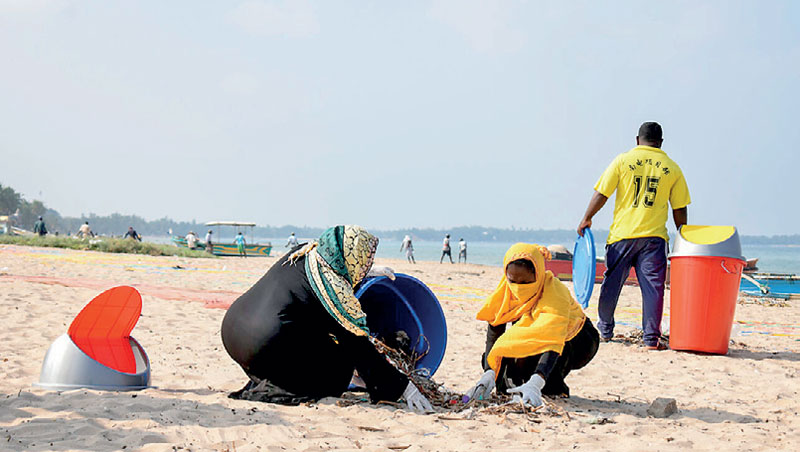Friday Feb 20, 2026
Friday Feb 20, 2026
Friday, 17 December 2021 02:40 - - {{hitsCtrl.values.hits}}

Man Grow
The British Council of Sri Lanka in partnership with Muslim Aid successfully completed the Active Citizens Social Action for Climate Change initiative in the Trincomalee district earlier this year. The overall program entailed six unique projects designed to mobilise youth to take action against one of the greatest threats affecting the global population at present – climate change.
The six projects carried out under the Active Citizens initiative include: Kinniya Climate Resilience, Parijatham, Muthur Guardians, Tidy Tide, Diamond Model Village and Man Grow.
The Kinniya Climate Resilience project aimed to create climate change awareness and promote social leadership among youth in Trincomalee. In that regard, a one-day workshop addressing crucial issues connected to climate change and resilience was arranged for senior students of Al Irfan Maha Vidiyalayam in Kinniya, where youth were urged to engage in clean-up campaigns, participate in tree planting and other remedial efforts.
The project Parijatham, carried out in the Potkeni Village, focused on poverty relief and environmental change. A volunteer for the initiative noted: “The villagers are dependent on home gardening and agriculture for their livelihoods. Devastating amounts of chemical fertilisers are used here in the interest of having higher yields. The project intended to incentivise organic agricultural practices and instil healthy eating habits among the community.”
Muthur Guardians carried out a ‘shramadana’ (clean-up) to eliminate algae and pollutants from water bodies in Nadutheevu, Muttur. According to a participant, extensive pollution in the region has resulted in a surplus of nitrogen and phosphorous causing algal blooms to spread at an alarming rate. Algal blooms produce harmful toxins, create ‘dead zones’ and hurt industries that depend on clean water.
Intending to minimise ocean pollution and plastic litter, the Tidy Tide project strived to raise awareness by organising beach clean-ups and installing waste bins with the support of the Trincomalee Urban Council, volunteers, and residents.
Under the Diamond Model Village project, 20 targeted families were incentivised to embrace organic farming in Muttur, Trincomalee. The project also entailed activities such as constructing a greenhouse, reforestation and educating the community on the benefits of organic farming via industry experts.
The sixth project, Man Grow, attempted to mitigate frequent natural disasters in Kinniya by planting mangroves along the coastline. Mangroves form dense ecosystems that act as walls or barriers against wind, storm surge and other natural disasters. A participant, Fahmeedha Haneef said: “Climate change is a universal crisis – one that can only be productively addressed through intercultural dialogue. The project served to bring communities closer together and we are hopeful locals will continue to work together to manage, mitigate and overcome the challenges the six projects intended to address.”
While tackling climate change was the primary objective of the initiative, it also served to promote social cohesion among different ethnic and religious communities. The organisers are pleased with the reception and outcomes of this project in the Trincomalee district and thus intend to extend it to other parts of the country, too, once normalcy is restored.
The British Council Sri Lanka has a number of projects planned as part of the Climate Connection program leading to COP26 hosted by the UK, in Glasgow, Scotland, from 1 to 12 November. Youth engagement and their youth leadership program will continue to remain the main vehicle for addressing climate change issues at the community level, bringing positive change to society at large.


Muthur Guardians

Tidy Tide